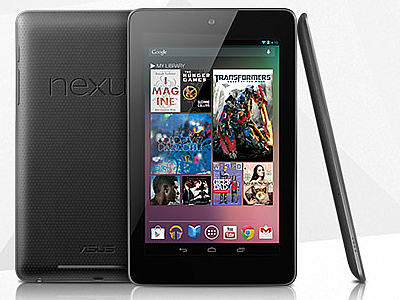Rumor: Google May Use LG for Third-Generation Nexus 7
Now that the second-generation Nexus 7 is out and wowing enthusiasts with impressive benchmarks, the rumor mill has now set its sights on the third-generation model. That's right; the new Nexus 7 isn't even a week old, and now there's talk that Asus will be dumped for LG in the next installment.
This rumor is a bit silly given that LG has yet to produce its very first tablet – its current cash cows are Android phones and Smart TVs. Yet the news arrives by way of analyst Ming-Chi-Kuo who has a successful track record in predicting Apple-related products, and accurately predicted many of the components used in the new Nexus 7.
Kuo said in a recent report that Google and LG will team up to advance display design in 2014. Both companies have worked together before, namely the current Nexus flagship smartphone, the Nexus 4. Thus it's easy to assume that the relationship could be carried over into the tablet sector.
Kuo noted that a partnership with LG would give Google access to subsidiary LG Display which provides panels to Apple for a number of its iOS devices. This would give Google a strategic advantage, as it would narrow the design gap between Nexus tablets and iPads thanks to LG Display's thinner and lighter panels, as well as its IPS solutions.
Currently, Samsung Display supplies panels for Apple's iPad, whereas LG Display and Samsung supply displays for the Macbook Pro, iPhone and iPod Touch. Samsung Display will reportedly produce a display for Apple's second-generation iPad Mini set to launch in the first half of 2014 despite Apple trying to distance itself from Samsung altogether.
It's quite possible Google has no plans to dump Asus, but instead to introduce a new tablet form factor manufactured by LG. What Google offers now is a 7 inch and a 10.1 inch device. Currently, the company has not addressed that sweet spot in between currently covered by Apple (iPad Mini), Amazon (Kindle Fire HD 8.1), Acer (Iconia W3) and other tablet makers.
As Amazon and Apple have shown, there's definitely a market for consumers wanting something less bulky than the Nexus 10 but larger than the Nexus 7. Both of these tablets have done well on the market despite their glaring flaws, but an 8 inch solution could prove to be just as popular.
Get Tom's Hardware's best news and in-depth reviews, straight to your inbox.

Kevin Parrish has over a decade of experience as a writer, editor, and product tester. His work focused on computer hardware, networking equipment, smartphones, tablets, gaming consoles, and other internet-connected devices. His work has appeared in Tom's Hardware, Tom's Guide, Maximum PC, Digital Trends, Android Authority, How-To Geek, Lifewire, and others.
-
ikyung I wouldn't mind seeing LG make the next Nexus 10. Throw in a Qualcomm S800 with a QHD LG panel for $399-499 hopefully?Reply -
BranFlake5 Ming-Chi-Kuo has Apple insight. He also predicted most of the Nexus products to Flop, but they never did. LG already makes the Nexus 4 (Pretty Darn Good) and the N7 Gen 2 already competes with Apple, Faster and better Display than the Ipad Mini. LG might be considered for the N7 G3 only after Asus said that the N7 almost broke them. I don't think Google will hop on the 8 Inch market quite yet though.Reply -
bobbysimpson Why would they not just stick with Asus? Asus is on a roll with the Nexus 7 and obviously knows how to make a great tablet. Haven't seen anything of quality in the tablet space from LG.Reply -
susaevol Please do not use "Rumor" to manipulate the users. I like Asus, it always create great products. Love Google + Asus!Reply
And ASUS and HTC may be a good match as well.
-
USAsky Who is listening to Ming-Chi-Kuo? He even did not have a PhD. degree.Reply
Asus is the best for Google in our real PhD-CS guys' eyes.
Do not make "Rumor" as news unless this website has become National Enquirer's Gossip column. -
VanGilder Michael You say ', but an 8 inch solution could prove to be just as popular.'. Yeah, just as popular as both the (7)inch and (10.1)inch, combined. I have an (8) inch Samsung (the note 8) and I think the 8 inch form factor will go 'viral'.Reply
